
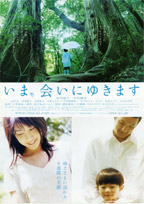
Ima, Ai ni Yukimasu
Japan 2004
Genre:
Romance, Drama, Fantasy
Director:
Nobuhiro Doi
Cast:
Yuko Takeuchi
Shido Nakamura
Akashi Takei
Yosuke Asari
Chihiro Otsuka
Mikako Ichikawa
You
Fumiyo Kohinata
Yuuta Hiraoka

Be With You
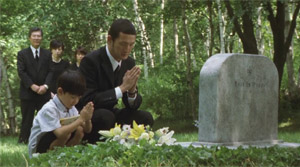
Story: Being just 28 years old Mio (Yuko Takeuchi) dies and leaves behind her husband Takumi (Shido Nakamura) and her son Yuji (Akashi Takei).
Takumi has a certain condition which doesn't allow him to be the father to his son that he wants to be. His wife wasn't happy because of him either, he thinks.
Yuji on the other hand believes that he is responsible for his mother's death since she became gradually more ill since his birth, as he over and over again
hears from his relatives. On her deathbed Mio promised, though, to return when the rain season comes. On a walk Takumi and his son then see a woman sitting
in a ruin: It is in fact Mio, although she apparently has no memory whatsoever. Father and son take Mio home with them and try to slowly make her remember her
old self. Mio wants to know how Takumi and she met each other and he tells her about their not so simple love story. But despite all the nice days the
reunited family spends together Takumi and Yuji are quite aware of the fact that Mio will have to leave again when the rain season ends...

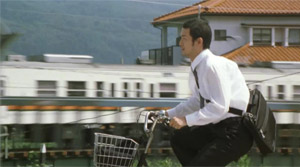
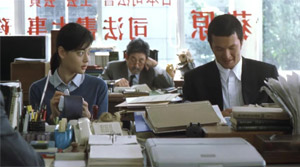

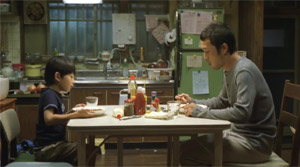
Review: It is difficult to tell a romantic story that can deliver something different from what we have already seen. And if a movie attempts
to achieve this by adding a supernatural note to all of it then this is even the more courageous and in most cases results in a misstep. However, "Be With You"
has a simple magic to it that will make you feel the calmness and security which a perfect family stands for. But first and foremost the picture revolves around
love, which very easily could have made the film end up being a corny story full of tears and a high amount of tissue usage involved. Even though the film is
in fact extremely sentimental in the end and at times can even be quite manipulative, it still pulls off the feat to tell its story with a lot of heart and
the kind of finesse that makes you happily overlook the apparent weaknesses.
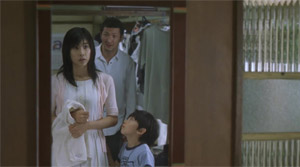
The plot might somehow remind you of a ghost story, but apart from Mio seemingly having left her grave in order to be with her family again this is a very
ordinary romantic story after all. The mystery around Mio's resurrection may linger in the back of your head, but you have to wait until the end to actually
get an answer. And maybe that answer wasn't really necessary. And the resolution doesn't make the plot less supernatural or fantasy-heavy either. The last
romantic flick with a supernatural story that also worked out well was the Taiwanese movie "Secret" and "Be With You" makes it easy
for us to come to terms with the fact that not eveything needs to be questioned from a scientific point of view. Why is that? Because the film makes use of
its characters very well within a very heartwarming story.
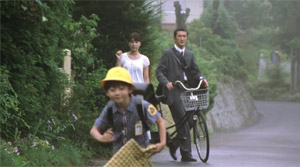
Yuko Takeuchi ("Strawberry Night") is the heart of the movie and oozes out the kind of love and motherliness which makes home a place to return to and feel
protected. Since Mio is home most of the time and does all the household chores she maybe looks a little bit too much fixed to the traditional role of a woman,
which might get some feminists het up, but there is no doubt that she makes her family happy. Yuko Takeuchi gives a sophisticated portrayal and convinces
in the most diverse situations which makes her the actual protagonist, although the story is told from Takumi's perspective in the beginning. Takumi is
embodied by Shido Nakamura ("Ichi", "Fearless"), whereas it needs to be pointed out that the father
somehow seems almost retarded at first, as if he were a child caged in the body of an adult.
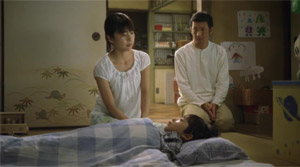
Accordingly, it is difficult to really accept Takumi and Mio as a couple. However, as the story unfolds we get a clearer picture of Takumi's mental and
physical condition and the reason for the feelings of love between the two even get an interesing touch thanks to a twist at the end. A special bonus is
Akashi Takei, who as the son gives a pretty mature performance without making it less authentic.
The story is based on a novel by Takuji Ichikawa and is also told through flashbacks at some points. Towards the end, after the actual finale, the film's story
is outlined from Mio's perspective, too, which contrary to other movies doesn't give us the impression that moviemakers simply didn't know when to end their
movie, instead it really has additional value.

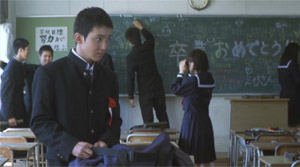
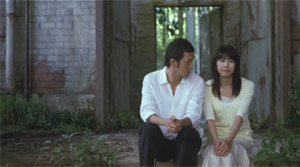


The switching between the story's angles isn't scattered throughout the film in a balanced manner, but takes place only at certain points and then successively. In fact, this should have given "Be With You" something episode-like, but strangely enough that is not the case. This is thanks to Nobuhiro Doi's ("Flying Colors") subtle directing. The colors and camera angles often remind us of a nice dream on a hot, rainy summer's day and the soundtrack underlines the feeling of otherworldliness that overcomes us, perfectly capturing love as a special variety of reality or rather fantasy. That's exactly why the supernatural aspects of the flick work out, too. "Be With You" can be very emotional and even in a predictable manner. Yet, it encompasses the quintessence of love and thus delivers the kind of kitsch that almost isn't one after all. A wonderfully told love story.

Disclaimer










